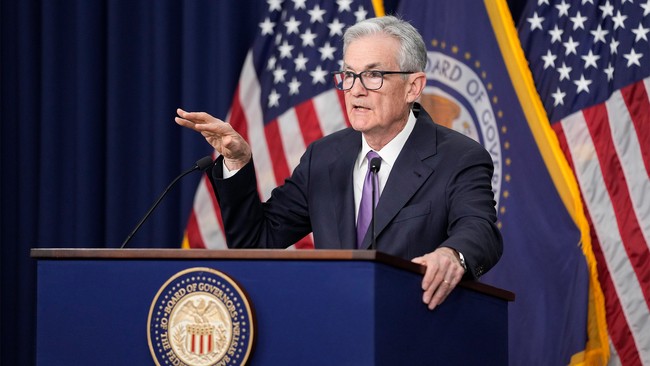
The Federal Reserve finally decided to cut interest rates last Wednesday by one-half of a percentage point and signaled more cuts could be on the way later this year. Markets greeted the long-expected move toward looser money with initial enthusiasm and then “sobered up a touch,” as The Wall Street Journal described it.
The markets would do well to stay sober. The interest rate cut will not undo the damage the Biden-Harris fiscal fiasco has done to the nation’s economy.
Fed Makes Aggressive Interest Rate Cut, Markets React
Fed Chair Jerome Powell emphasized his belief that the economy is in good shape, in a press conference announcing the rate cut. “The U.S. economy is basically fine,” Powell said. “Our intention is really to maintain the strength that we currently see in the U.S. economy.”
Last Tuesday’s report from the U.S. Census Bureau on household income, poverty, and health care in 2023 indicates otherwise. Workers are receiving lower pay after inflation, and the losses have been worst for lower-income workers. “Real median earnings for full-time workers last year declined 1.6% and even more for high-school grads (3.3%),” The Wall Street Journal reports. “This means inflation outpaced wage gains for most low-wage workers.”
American households are struggling financially in the Biden-Harris economy. Real median household income is lower than it was in 2019 and has improved little since January 2021, the Census data show. In fact, among whites, Asians, and Hispanics, real median income grew by 10 times as much under President Donald Trump as it did during the Biden-Harris administration, and blacks’ median income growth under Trump was more than double the Biden-Harris amount, economist Larry Kudlow noted on Fox Business News.
The Wall Street Journal summarizes the current economic situation as follows: “The truth is that the Biden inflation has left most Americans worse off than they were before the pandemic.” Americans are in fact much worse off than they would have been with a continuation of Trump’s pro-growth policies, as the Census numbers make clear.
Economist John Rutledge argues that the true inflation rate dipped below the Fed’s target more than a year ago, the Fed’s overlong money-tightening has already damaged the economy, and the current rate cut is insufficient, less than half of what was needed.
Citing a Consumer Price Index element called owners’ equivalent rent, which nobody actually pays, Rutledge says annual price inflation is now just 1.4 percent. That means the Fed has “damaged bank balance sheets and shut down bank loans” unnecessarily for at least a year. “Small businesses and their employees are paying the price,” Rutledge writes.
What is at issue behind all the numbers is the economic effect of Biden-era federal fiscal policies and the government’s delegated management of the nation’s financial system via the Fed. The past year’s economic numbers have shown unusual combinations of rising stock markets and decreasing real after-tax income for workers; low unemployment, decreasing inflation, and job stagnation for American-born workers; much-higher housing prices and low sales; high consumer spending and debt with slow growth of manufacturing; and recurring downward “corrections” of government data that show past reports were unduly positive.
Much of this evidence of a highly disturbed economy has been attributed to the 2020 COVID-19 measures, which had an enormous, rapid depressive economic effect and then spurred an equally fast positive correction. The argument is that the U.S. economy is only now recovering from that trauma.
That explanation, however, ignores a hugely important factor: the massive increase in government spending and debt after the economy had already recovered from the pandemic lockdowns, beginning in early 2021 and lasting through 2022 (at which point the Democrats lost their majority in the House of Representatives and further spending increases were limited—though in fact large spending cuts were gravely needed).
I believe that the deficit-spending spree of 2021 to the present is responsible for the drab economy of the Biden-Harris era and its current precarious condition, in which numbers such as rising stock markets and low unemployment contrast with decreasing after-tax income for workers and record increases in federal debt and consumer borrowing. The federal government after the pandemic foolishly pushed an enormous expansion of spending by government and consumers alike while suppressing the supply of goods (especially) and services through a record-smashing increase in government regulation under Biden and Harris.
Those reckless and ignorant policies unleashed inflation and the subsequent attempts by the Federal Reserve to reduce the money supply. Now the Fed has finally decided to reverse course, start lowering interest rates, and suspend its money-reduction policy of selling securities. That, we are told, will get us to a soft landing in which inflation stabilizes near the Fed’s target (2 percent per year) and unemployment does not rise appreciably.
However, the fundamental problem remains: Federal spending and regulation are vastly greater than they should be and are suppressing the production of goods and services. That is not a formula for rising prosperity, as the contrasting records of the past two administrations show.
In fact, the Fed’s rate cuts may not be good news at all. The Fed generally starts reducing interest rates just before a recession hits, or very early into a recession that has yet to be declared, and then continues the rate cuts during the downturn (see Fed chart here).
Two facts: we are not in a recession (as far as we know at present), and the Fed has begun cutting rates and indicates it will cut further in the coming months.
History suggests that the Fed’s loosening of the money supply may be arriving too late to prevent an eventual downturn caused by the massive overspending imposed by Biden and Harris.
S. T. Karnick (https://stkarnick.substack.com/) is a senior fellow at The Heartland Institute and author of the Life, Liberty, Property weekly e-newsletter.
